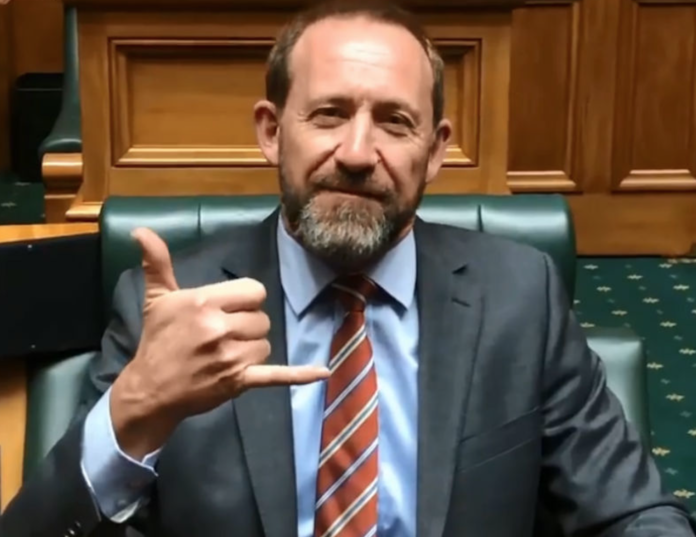On 4 July Stuff published my opinion piece on the angry behaviour of Minister of Health Andrew Little in publicly disparaging dedicated people and organisations strongly committed to the provision of accessible quality healthcare: Health Minister’s angry behaviour denying the obvious.
I referred to his derogatory comments on the “nominal leaders” of primary care (essentially general practice representatives), rural general practice ownership, New Zealand’s pharmaceutical purchasing agency Pharmac, Waikato emergency medicine specialist Dr John Bonning (also President of the Australia and New Zealand College of Emergency Medicine), and finally the NZ Nurses Association (NZNO).
Continued attacks on nurses
Little’s public attacks on NZNO on behalf of nurses have continued. They are based on conscious misrepresentation rather than misunderstanding in claiming that NZNO had reneged on a pay equity agreement for DHB-employed (now Health New Zealand) nurses. The health minister knows full well that this was an agreement between the two negotiations subject to ratification.

Andrew Little continued to attack nurses union
NZNO’s ratification process is democratic based on involved a membership ballot. Following its report back to nurses of the details of the proposed settlement, it quickly became clear to NZNO that, such was the strength of the negative membership feedback, it would most likely be rejected in the ballot. Consequently NZNO focussed on trying to fix the issues behind the negative feedback.
This is what I would have done if I were in NZNO’s difficult position (at least I hope so). But, rather than appreciating the predicament and working with NZNO to sort it out, Andrew Little opted for aggression and distortion. The inevitable effect is to further escalate tensions between nurses and government.
From crisis to catastrophe or carnage
All this is in the context of a wider workforce crisis in hospital and community healthcare which this government, after nearly five years in office, has to assume much of the responsibility for. It did inherit a workforce crisis in October 2017 from the previous National led government. But the current government can no longer dine out on this.
The government’s obsession with health restructuring meant that it took its eye of the ball. The consequential neglect of workforce has meant that crisis has worsened to ‘beyond crisis’.
This became extreme when it opted to restructure the health system in the middle of a worsening pandemic, along with a predictable worsened winter flu. The result was create additional havoc for health professionals and patients. Incompetence at best!
The consequence of this obsession was discussed in my last Otaihanga Second Opinion blog (8 July): Health system now beyond crisis. Now words like catastrophe and carnage are coming part of the language of exhausted health professionals at the clinical and diagnostic frontline.

Journalist Andrea Vance makes a devastating critique of government’s health system performance
This is the context in which the earlier (26 June) Sunday Star Times column by Andrea Vance should be read. It is a no-nonsense critique of the government’s performance focussing particularly on the current health minister, who she reports health professionals describing him as Dr Do Little (ouch): Dr Do-Little: healthcare staff are at the end their rope with the government. I would describe it as chickens coming home to roost.
However, perspective is required in respect of the minister. This government has been in office for nearly five years but Little has only been minister for less that two of these years. This government inherited but neglected the workforce crisis in 2017; Little inherited this neglect but continued it.
For full context, while the government focussed on restructuring at the expense of workforce, health ministers have not been the main driver of this approach. This has been Prime Minister Jacinda Ardern.
She decided the appointment of Ernst & Young senior partner Stephen McKernan to head the restructuring transition unit. Further, it was her call for this unit to be based in her department.
From anger to duplicity
Andrew Little has attempted to respond to the daily frustrations of health frustrations in an opinion piece published by the NZ Herald (18 July): What health minister Little wants for healthcare services.
The good thing about his opinion piece is that he manages to resist making derogatory comments by organisations and individuals in the health system. He does refer to the nurses pay equity dispute but not provocatively.
There is some empathy that appears genuine to the predicament of the health workforce. He does use a ‘c’ work to describe the state of the workforce but it is not crisis (or catastrophe or carnage); his word is ‘chronic’. Andrea Vance used yet another ‘c’ word; collapse.
Nevertheless, much of the opinion piece is embellishing self-congratulatory political spin. No surprises here and not unique to this health minister. But, towards the end of his piece, he resorts to outright duplicity with the following claim:
With our health reforms now in place, we’ve finally got the opportunity to work together to build a workforce that not only meets our healthcare needs but also provides satisfying and worthwhile careers for the people who work in it.
What he is doing is accusing the now disbanded district health boards (DHBs) for causing the workforce crisis. This is grossly unfair. Since the formation of DHBs the overall responsibility for the health workforce rested with the health ministry with bodies set up for that purpose. Further, DHBs don’t determine their funding necessary to employ staff; government does.
Replacing DHBs with Health New Zealand is little more than a repositioning and further centralising of bureaucracy (and those who work in this bureaucracy). Both the chief executive of HNZ and the chair of its workforce group are former DHB chief executives. Most of HNZ’s other senior positions are being taken up by former DHB chief executives and other senior managers.
There is good logic behind these appointments because they know how the health system works. But let’s not pretend that it is anything more than repositioning and centralising.
The health minister’s switching from being angry to being duplicitous does not improve the situation. Instead it means continuing loss of workforce trust and confidence in the minister.
So what happens when a health minister loses the trust and confidence of the health professionals that keep the health system going in such turbulent times and at the cost of their own health?
The minister becomes damaged goods. In other words, dead minister walking.
Ian Powell was Executive Director of the Association of Salaried Medical Specialists, the professional union representing senior doctors and dentists in New Zealand, for over 30 years, until December 2019. He is now a health systems, labour market, and political commentator living in the small river estuary community of Otaihanga (the place by the tide). First published at Otaihanga Second Opinion






The dude should have resigned from politics once he decided that no one is gonna vote for him as PM. Why this wanker is still in parliament only the Quota Person who is “leader” of the Labour Party would be able to answer. But anyone who expects this Labour Crowd to do a better job at Healthcare reform should remember that the DHBs were created by Labour under Helen Clark.
Maybe the man is simply just a civilian loser who found home in Union and Politics cause it sure beats working and having to sit trough an annual job appraisal.
I understand him not wanting to be railroaded into using the word ‘crisis’ when ‘fucked right up’ will do perfectly well.
Marvellous gagarin even though I wouldn’t use the same language.
The public health system has not been delivering for Maori, PI, the disabled and poorer NZers and it’s high time this was addressed. I did not see any protest from any health professionals during the nine years we were all neglected under National in fact they were happy for us to carry on with the status quo. And no one seemed to care about those being neglected at least no one (from mainstream) wanted to step up and callout the racism and discrimination they were happy to just carry on with business as usual. So health professionals are losing faith in the Minister of health like many of us are losing faith in our health professionals who themselves have not delivered.
People who do not look after themselves should not complain about the system letting them down. If people stopped smoking and consumed less sugar and fat this would take pressure off the health system so they could look after those disabled and genuinely sick.Getting themselves and their families vaccinated against a variety of complains would help
and didn’t get into car accidents, didn’t get pissed and have a saturday night fight, fall off ladders or behave generally like divvies
Wonderful so society does not give a hoot about others then. This goes against teaching of all the major religions and morals in society. Have another think on that one.
Health professionals deliver day in day out. Save lives, offer treatment.
As long as there an adequate workforce no’s wise,whoever rocks up will get treated. As long as there are the staff, you will receive treatment. Even if you bully, Harare’s or assault the staff, you won’t be refused treatment.
So blaming the health professionals. Without them, there is no health system. Andrew little resigns, some other bugger will take over, rinse and repeat
I’m sorry, but I dont see anyone else offering any solutions.
The GP’s seems to think that the solution is to be allowed to charge patients more, while National wants to import more workers from overseas.
Go s are charging more because the govt haven’t kept up with their costs
Dead Minister walking, we can only hope!!! (Not meaning it literally)
Dr Do Little at his very best.He is still ngry at the people rejecting him for Jacinda
Stop talking a load of rubbish Trev
Why is this piece devoid of the elephant in the room? The effects of the disintegration of public health on those who are forced to rely on it?
How many patients is this catastrophe killing or leaving disabled?
Yes, this mess is terrible for the workforce and it is a good thing that they are able to protest how they are being affected. But these workers are not making paper clips. As just one person affected as a patient, who is already pointlessly permanently disabled not by accident or disease but as a direct result of the health crisis, and is now just dumped, I’d like to know if there is any proposed remedy for patients, as well as for workers.
Continually disappointing minority groups especially those who are of Maori descent.
Astronomically long wait times.
Unprofessional doctors who pass the buck constantly.
Lack of training for some staff in some areas.
I’m not one to complain but it is unfortunate that our health sector has amounted to this pile of mess. Especially since we once boasted of having one of the best health systems in the entire world!
Brilliant Leadership! Yours, Bert.
Another headline…”Continued attack on Health Minister”.
Another headline…”Coward Kraut has a real name but is a gutless piece of work and climate denier”
Yours, Coward
As I’ve said repeatedly Bert even for you that’s just silly.
Hey troll welcome back, stupid comment from yourself as myself and many on this site recognise when you offer an “opinion”, no facts just very very boring opinions. You are TDB idiot.
Thanks Bert.
Opinions are based on a view or judgement not necessarily based on fact or knowledge.
An example socialism is better than capitalism.That’s classic opinion.
As is capitalism, is better than socialism, just classic opinion, not based on fact.
Yes that is correct.
Gosh after all this time you have finally grasped something.
Astounding.
Simple liar Bob, you are quite simple.
Did listening to Hosking enable you to come to that conclusion, or did you say you’ve never listened to him. I’m sure the readers on this blog would like to know the truth?Simply Astounding.
Bert as a person who works in the health sector do you still believe Andrew Little is doing a good job?
As a person who doesn’t but is so sadly influenced by the media and right wing attack dogs and right wing bias like yourself, do you?
No I believe the Nurses and Doctors and other health sector workers who by a huge majority believe he is not.
An overwhelming majority do, your “belief” of us health workers is a poor guess. The right wing media should never be believed, that is your sad mistake.
Add to the overwhelming majority that support Little is the fact we know that health was left in tatters by National underfunded salaries and infrastructure. Of that there can be no excuse. We know Labour was left with a dog in Mental Health and Little quite rightly is investing millions to correct Nationals poor governance…
https://l.facebook.com/l.php?u=https%3A%2F%2Fi.stuff.co.nz%2Fnational%2F129365667%2Fgreen-light-for-waikatos-muchneeded-115m-mental-health-facility%3Fcid%3Dapp-iPhone%26fbclid%3DIwAR2FWa231i2-LV1PR2PWHyQsbFUj-Xa1VzKyaCqunqiNOMBTJLLkoWDCKoY&h=AT1v1xb9oEotlae14Sd4_iPmGy1ciehQf5tvTmsfnD3iljf06xUaszZ00S0qivaj4oD2FY72H-b4PNCZKxZFNkaI1YCUPqzd-vBXG1CMgHc7mSgLhSx0WX5vCG3YZKTz5WgPVMUY9pjCl_Sf-wOdLOzEQ5uUYlCG-rw
Another example of Little and Labours proactive health response.
Then why are health sector commentators like Ian Powell saying Little has lost the trust and confidence of the workforce?
Commentator singular.
Bam!
No one in our ex DHB knows who Ian Powell is?
And Bam!, just now our salary increase lump sum has landed in our bank accounts, Salary increase and back pay to arrive shortly.
Thank you Andrew Little, you understand how to negotiate and by far the greatest Health minister in our history!
NACT low wage and low pay immigration policies are so 80’s.
All health professionals knew we were in trouble back in 2014 and yet Coleman and National did nothing, we have been in catch up mode ever since. When Little stands and states Health was degrade under National he was right.
An extract taken from the development of the Wakeria mental health facility constructed under a co governance model, of which I was part of the new model, note the 2014 survey of staff…
“Key workforce challenges
In 2014, Te Pou (the national centre of workforce development for the mental health, addiction and disability sectors) surveyed 7,613 employees in the adult mental health workforce across New Zealand. Survey responses suggested that a number of clinical and allied health roles were at risk of future shortages, including nurses, consultant psychiatrists, clinical psychologists, occupational therapists, and support workers (Te Pou, 2014).
These findings were reflected in the report He Ara Oranga, which pointed to major issues with the recruitment and retention of staff, including negative perceptions about working in mental health. The report noted that these issues place pressure on existing staff, and will impact future recruitment (Mental Health Inquiry, 2018).
The opening of the Waikeria mental health service will add pressure to the workforce in this sector, with particular reference to two critical factors that impact our ability to develop and operationalise a skilled workforce:
known workforce shortages in the adult mental health sector
large scale recruitment into a rural setting (given that the prison is 16km south of the small town of Te Awamutu).
To effectively respond to these challenges, the agencies involved will focus on growing the current workforce, which includes implementing strategies that are both innovative and evidence based.”
So Bob your continued silly opinions and beliefs are just that.
Ok then I guess so are the majority of the health sector workers also silly given a large majority think Little is doing a bad job ?
I’ve already told you, are you seriously thick or what, the overwhelming majority don’t think he’s doing a bad job. You don’t work in health but are brainwashed by the media. I suggest you open both eyes.
I can make an appointment for you to come and talk to them personally and get an on the ground view, not right wing propaganda?
What, another lie Bob, they’re starting to build up.
See above what the majority of mental health workers thought in 2014 under the corrupt National gvt.
Even someone as right wing biased as you are cant deny a health workers survey.
And Ian Powell never interviewed any of them.
Govt would spend millions to make Dhbs appear centralized, however it is all lipstick on a pig.
Until all hospitals use same data & reporting technology for all depts that is centrally visible, has same enterprise management system, all hospitals will continue to work just as they always have. Without sunlight on actual workings nothing materially changes.
Dhbs need huge investments in technology to improve productivity.
Currently Dhbs lose money in every way conceivable, whether its putting wrong number or type of staff on shifts, duplicating paperwork, poor planning skills, staff thinking hospitals are charity so not charging correctly or overpaying for goods & services etc etc.
The list is long. Unions do not help the cause either with a nurse in a ward being paid same as a ED nurse…why would someone sign up for more stress for same money?
Good luck to Andrew Little, while centralization appears good in theory, to achieve that will take incredible skill, will power and money. While this govt has lot of money, it has little skill or will power. Hence, there will be a big price to pay for that.
Data management & reporting systems which actually synced and was watertight to hacking, yes, but I feel that boat has long since sailed and hospitals are a dangerous place to be. Last year’s hack of Waikato DHB’s system a case in point.
The boat hasn’t even started, as DhBs haven’t invested meaningfully in technology. Data security is part of that package. Without good data, no meaningful change can take place.
Dhbs need huge investments in technology to improve productivity.
That is questionable. Partly because it is heard so often. I think we are falling into a fly trap so we are dependent on tech. Tech is creating our need for it, and gradually we are expecting 21st century outcomes while growing numbers of us are consuming medications that give us another 5-10 years at the end of our lives but are prepared to see babies born at the side of the road, and parents hassled to be both working and have fines imposed when we fail to meet some demand in the time and way prescribed. In other words some need to be less demanding for the latest for ourselves, and when we help ourselves ensure that a decent wad is going to the young or vulnerable who will also be putting their talents in community activity.
Have a wary look at the glib bastards who are piling expensive costs or ideas on us and which may be unnecessary if we worked as a caring supportive community. Have a full life, don’t go out of your way to risk your health, and expect to be nursed and medicated life-long, interact kindly with the people around you, and die after a full life at a reasonable age after retirement. Help the life process and progress, but hold back on the tech that is short-term; that leaves people less capable at their tasks, replaces people with robotisation, produces communication systems that seem to breed unkindness, such as harassment of anyone that various people decide is ‘the other’ and breeds hackers and soulless thieves. Business tech follows the god of efficiency and speed, and it’s a false goal.
A great thinker Aldous Huxley decided it was actually destructive of humanity.
The worst enemy of life, freedom and the common decencies is total anarchy; their second worst enemy is total efficiency.
Aldous Huxley (1956). “Adonis and the alphabet: and other essays”
In the course of evolution nature has gone to endless trouble to see that every individual is unlike every other individual….Physically and mentally, each one of us is unique. Any culture which, in the interests of efficiency or in the name of some political or religious dogma, seeks to standardize the human individual, commits an outrage against man’s biological nature. Aldous Huxley
https://www.azquotes.com/author/7118-Aldous_Huxley/tag/efficiency
https://www.degruyter.com/document/doi/10.3138/9781442697430-012/html?lang=en
… In contrast to both direct and indirect indictments of the specifically social and personal costs of an investment in efficiency, Aldous Huxley’s Brave New World (1932) draws out the broader social, cultural, and philosophical implications of the industrial revolution that the novel metaphorically attributes to Henry Ford. Displacing Christ as the central cultural figure, ‘Our Ford’ is revered as the founder of a ‘civilization’ projected into the future,…
Not surprisingly, critics have linked the standardization and rationalization of all aspects of social life in Brave New World to Ford’s obsession with the efficient production and mass consumption of the car as a technology dedicated to speed and motion. Carrying the mantle of the ‘founding father’ is the current World Controller, Mustapha Mond, who is modelled on both the Turkish political reformer Mustapha Ataturk and the British industrialist Sir Alfred Mond.
Restructuring the MOH during a one in 100 year pandemic is like doing a complete engine rebuild on the side of the road, when all you have is a flat tyre.
It is also best describes the current govt, Ideology trumps commonsense.
Most definitely BG as George Bernard Shaw said “ Our prejudices are so deeply rooted that we never think of them as prejudices but call them common sense.”
No wonder National fucked our health system with a steady as she goes attitude like yours. Common sense you lack.
Bert the Quote above applies equally to you.
The quote above was made for YOU!